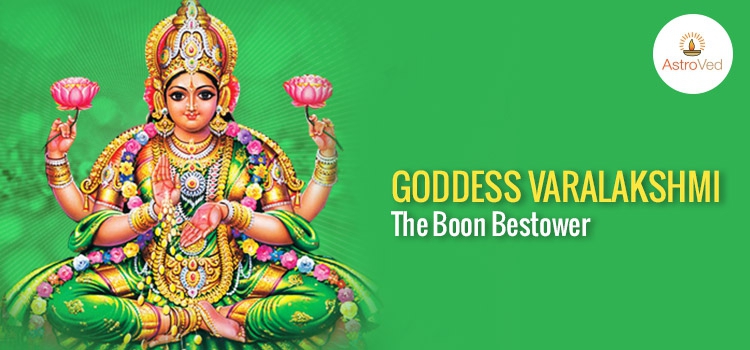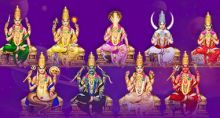Goddess Varalakshmi: The Boon Bestower
Goddess Varalakshmi – She who Grants Boons
Goddess Varalakshmi, a form of Goddess Mahalakshmi, the consort of Lord Vishnu, is the Goddess who grants boons. She is both bestower and protector. On those who are deserving, she bestows abundance depending on their past karma and devotion. She also protects devotees from sickness and adversity. Goddess Lakshmi represents wealth, good fortune, success, accomplishment, grace, beauty, splendor, royalty, auspiciousness. She has another name, Sri, which means ''wealth.' In ancient times this represented food grains. In Hinduism, worshipping Lakshmi is regarded as a suitable remedy for alleviating suffering. Propitiating her regularly and chanting her names is believed to bring good fortune and prosperity. Being the Goddess of wealth, Lakshmi is preserver, provider, and nourisher. The word 'vara' in Varalakshmi means 'boon.' Goddess Lakshmi is believed to have appeared from the milky ocean or Kshir Sagar.

Varalakshmi Vrat/Pooja
Hindus celebrate Varalakshmi Vratam or Nonpu to propitiate her. This festival is celebrated both in the north and south India. In North India, it is called Mahalakshmi Pooja. The festival falls on the second Friday or the Friday before the Poornima or full moon in the month of Shravan which denotes August – September according to the Gregorian calendar. Goddess Varalakshmi is shown with two lotuses in two hands and the other two hands showing Abhaya and Varada gestures, she is called Varalakshmi. The Pooja is performed by sumangalis or married women, to ensure the well-being of their family members, particularly the husband. It is also done to beget progeny. The popular belief is that worshipping Goddess Varalakshmi on this day is equal to worshipping Ashtalakshmi – the eight goddesses of Earth, Wealth, Earth, Love, Wisdom, Strength, Fame, Contentment, and Peace.
Legend behind Goddess Varalakshmi
The Puranas mention that Sage Suka tells Sounaka and other sages about a great Vrat that had the power to bring prosperity and happiness to all women. Once, there was a pious and chaste woman called Charumathi in the ancient land of Magadha. She lived in the prosperous town of Kundinyapura (now in Amravati district, Maharashtra). Charumathi was a woman who was very devoted to her family. Impressed by this, Goddess Mahalakshmi came in her dream and told her to worship Goddess Varalakshmi to fulfill her wishes. She also said that the Pooja should be offered on the Friday in Sravana month before Poornima or the full moon night. When Charumathi told her family about her dream, they were very encouraging. Other women in the village also took part in the Pooja. They made many sweets and delicacies and offered them to Goddess Varalakshmi, and they chanted sacred hymns. After the Vrat got over, Charumati and the other women were prostrating when suddenly they found themselves adorned with gold and diamond jewels! Charumati's house too resembled a palace. Everyone felt that it was because of Goddess Varalakshmi's grace.
Offerings for Varalakshmi Pooja
Traditionally, during this Pooja, women offer prayers to Goddess Lakshmi along with fruits, sweets, and flowers. A kalasam (pot) representing the deity would be decorated with a saree, gold jewels, and flowers. Before it, the offerings are placed. Among the offerings is a rakshai (sacred thread). Once the Pooja is over, a thread is worn around the wrists of the women. The thread signifies piety and protection. Also, many things are given as gifts to the sumangalis. There are no caste or creed restrictions for this Pooja. Women believe that this Pooja will bless their family with wealth and well-being.
Legend goes that this Pooja was recommended by Lord Parameswara himself who wanted his consort, Parvati, to perform it for the prosperity and happiness of the family. Eventually, it was emulated by married women who prayed for boons (varam) for the well-being of their own families. Sometimes, the women prayed for getting children. Supposedly, worshipping Goddess Varalakshmi on this day is equal to worshipping Ashta Lakshmi.
Legend behind Varalakshmi Pooja
The importance of Varalakshmi Pooja finds mention in the Skanda Purana. The importance of the Pooja was explained to Goddess Parvati by Lord Shiva. The Goddess wanted to know about a Vrat that would be beneficial to a woman and help her have a happy and prosperous life on earth. Lord Shiva then told her about the Varamahalakshmi Vrat. There are some popular scriptural stories associated with the vrat. One is the story of "Shyamabala."
Shyamabala was the daughter of King Bathrasiravas and Queen Surachandrika. Her husband was the prince of a neighboring kingdom. Once when Shyamabala was visiting her parents, she saw her mother chasing away an old lady who was advising her to perform Varalakshmi Pooja. However, the queen did not take kindly to a beggar giving her advice, and so she drove her out. However, Shyamabala, being kind-hearted, gave the old lady a patient hearing on the greatness of Varalakshmi Vrat. On returning to her country, she performed the Vrat as the old lady had told her. Soon, her kingdom began to prosper and her husband, the prince, was praised by all for his good governance. At the same time, Shyamabala's parents were facing many problems, and the people too were suffering greatly. Soon, they rose up in revolt.
When she heard about the difficulties in her parent's kingdom, Shyamabala sent her parents many pots of gold, but as soon as Queen Surachandrika's eyes fell on them, the gold turned into ashes. When she heard this, Shyamabala felt that all this was happening because her mother had driven out the old woman from the palace. She realized that it was Goddess Lakshmi who had come as the old woman in disguise. Shyamabala advised the queen to beg pardon of Goddess Lakshmi and perform the Varalakshmi Vrat. When she did so, the king and queen recovered their wealth and glory.



















